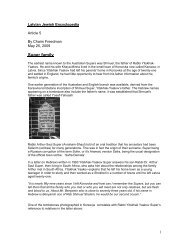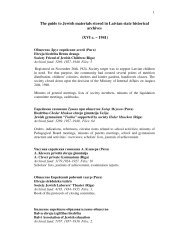Small Riga Ghetto
Small Riga Ghetto
Small Riga Ghetto
Create successful ePaper yourself
Turn your PDF publications into a flip-book with our unique Google optimized e-Paper software.
249<br />
III.<br />
A new transport of Hungarian Jews, women and men, arrived in our camp<br />
from Buchenwald. Although they were not the least bit nationalistic in their<br />
attitude, they were Jews all the same. In terms of their outward appearance<br />
they made a very good impression. This group included excellent professional<br />
people, and the women were young and pretty. They weren't keen on making<br />
contact with us, for we didn't appeal to them in the least. The camp elder immediately<br />
got to work on them, using his methods to "make human beings of<br />
them". The only thing they could do to his satisfaction was to march. They had<br />
been officers and soldiers, and they knew how to do it because of their army<br />
days. In a marching competition they won the first prize.<br />
We used Sundays, when we didn't have to go to work, to clear up. Now and<br />
then the camp elder made sure we "got some fresh air" by chasing us outside<br />
to march in the cold without our coats on. We spent our free time in our "dining<br />
room". We mended our clothes and waited to be ordered to go to work<br />
again. Schuller would always appear very suddenly. What angered him the<br />
most on his visits was when he found one of us wearing a scarf around his<br />
neck. That person would immediately receive a real beating.<br />
On Sundays we also visited our comrades in other barracks, for often we<br />
hadn't seen them all week on account of the day and night shifts. On one of<br />
these visits I met a certain Mr. Schäftel, a teacher from Vilno, and over time I<br />
became quite friendly with him. He was a very gifted human being and, most<br />
importantly, had a broad political perspective. His optimism was as great as<br />
mine, and both of us firmly believed we would eventually be liberated. On the<br />
great Jewish holiday of Purim he held an excellent lecture in his block. The<br />
meaning of Purim gave him a great deal of material to compare with our life at<br />
that time. His listeners were gripped by his talk. Unfortunately, I was unable<br />
to attend, because I was working elsewhere.<br />
Also living in this block were Dubin's son and his secretary Golowtschiner.<br />
Both of them looked ghastly. They were still observing the kosher regulations<br />
and thus were hardly able to eat a thing. Golowtschiner soon collapsed from<br />
weakness, so he requested a work assignment inside the camp. When the camp<br />
elder offered him a position that involved using a rubber truncheon, he refused<br />
it. He lasted only a short time doing factory work and soon died of starvation.<br />
Young Dubin often visited me in his free time to pour out his heart to me. He<br />
regarded me as a genuine native of <strong>Riga</strong> and was still convinced that his father<br />
was living in Soviet Russia. Also lodged in the same block were the artists










